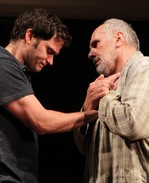SITE GUIDE
SEARCH
REVIEWS
REVIEW ARCHIVES
ADVERTISING AT CURTAINUP
FEATURES
NEWS
Etcetera and
Short Term Listings
LISTINGS
Broadway
Off-Broadway
NYC Restaurants
BOOKS and CDs
OTHER PLACES
Berkshires
London
California
New Jersey
DC
Connecticut
Philadelphia
Elsewhere
QUOTES
TKTS
PLAYWRIGHTS' ALBUMS
LETTERS TO EDITOR
FILM
LINKS
MISCELLANEOUS
Free Updates
Masthead
A CurtainUp Review
The Intelligent Homosexual's Guide to Capitalism and Socialism With a Key to the Scriptures
By Elyse Sommer
|
Hear what I'm saying objectively, divorced, from sentiment, and, also times change and we have to change with them, epectations have to yeild to, to material realities. I want to liquidate. And then vacate. — Gus, the patriarch announcing his plan for the Brooklyn brownstone that represents the family's wealth and generations of their toil and for his own exit from the mortal coil. His despair is less about death which will come whether with time or self inflicted, but the despair over his life and the state of the world. |

Michael Christofer (right) and Stephen Pasquale (left)
(Photo: Michal Daniel)
|
To make a way too long story short: Tony Kushner's ambitious story of a family's relationship to politics, sexual identitiy, the labor movement — and, yes, death — would realize its ambitions much more successfully if it were forty minutes shorter; also if some of the references to names and events that won't mean anything to many in the audience were r clarified. My own unscientific intermission mini poll didn't come up with a single person who knew that there really was a New York Congressman named Vito Markantonio, let alone what his politics were. Short of some clarification within the text, a page of background notes in the program would help. But enough with the quibbles. Despite taking too much time to tell its story but not taking the time to avoid having all the erudite references distance the audience from the play's emotional heart, this is a play that no Kushner fan or serious drama enthusiast will want to miss .
Mr. Kushner has assembled his fictional Marcantonio family in a brownstone house in Brooklyn that represents their history as working class immigrants, passionately involved with labor and Marxism, and proudly displaying portraits of a cousin who, unlike the fictional characters on stage, actually existed: Congressman Vito Marcantonio who was first elected to the United States House of Representatives from New York in 1934 and after joining the Labor Party was re-elected for six terms in 1939.
The family has been called together by their aunt Clio (Brenda Wehle). to discuss and vote on a life or death situation (shades of how it was done back in her Marxist days). The situation to be voted on is that Gus (Michael Cristofer), the family patriarch, plans to provide for his children by selling the house and then end his life. His stated motive for suicide is that he's certain he has Alzheimer's which runs in the family. Since you'll find Cristofer's Gus pretty sharp, it's not just his health. that draws him to the grim reaper (though he does have a bum heart) but because he's apparently in despair about the life he has lived and in fact tried to do himself in once before.
Quite a family, these Marcantonios, whose anarchist-communist roots go back to Gus and Clio's own grandfather. For Gus that meant not just being a dock worker, but fighting for his fellow workers' financial security. For Clio it meant getting away from home, first as a Carmelite nun then, true to the Marcantonio political gene, as a member of a revolutionary cult in Peru. Now retired and world weary, Clio is a stone-faced, quiet woman of few but pungent words, who wants the family to arrive at a consensus opinion about their father's plan for the house and himself so that she can leave Brooklyn for a less complicated existence.
Though the suicidal Gus has not been an easy father his children aren't ready to vote for his plan and unsurprisingly, the get-together stirs up a hornet's nest of long repressed feelings. Clearly Gus cares for his family. In fact, he's been the sole parent since his wife died giving birth to V (Steven Pasquale), the 38-year-old youngest son named for the famous cousin, his first passion has always been the Movement for workers rights. Not exactly the basis for a close, happy family, but then plays about dysfuntional families win more prizes than sweet and loving clans (Think Tracy Letts' Pulitzer Prize winning August: Osage County which Kushner's play in many way resembles even though Lett's troubled clan gathers in Oklahoma instead of Brooklyn and revolves around the disappearance of their patriarch who, unlike the almost always on stage Gus, is seen only at the beginning).
The emotional problems with dad notwithstanding, his leadership in a strike that gained guaranteed income for him and his fellow union members made him a man on a pedestal to his children and influenced their career paths, even though Gus himself still views that strike as a pyric victory since the benefits gained were limited to current union members. Oldest son Pill (Stephen Spinella) started out to be a labor historian but has yet to finish his dissertation and has instead become a high school history teacher. Daughter Maria Teresa (Linda Emond), known as Empty for her saintly namesake's initials, is also propelled by the passion for labor rights, first as a nurse who organized her fellow nurses, and eventually as a labor lawyer. V (Steven Pasquale) has followed a less intellectual career path, but has built his ability to work with his hands into a construction business (non-unionized). It's V who's kept the house in shape so that it can fetch more than $4million dollars.
This being an epic-length play, the situation about the disposal of the house and whether Gus will die sooner rather than later, needs a few more problems to keep things at a dramatic pitch through four acts and two intermissions. Not to worry. The Marcantonios lives are full of other thorny issues to be worked out.
Since Pill's dissertation, if ever finished, will be entitled The Intelligent Homosexual's Guide to Capitalism and Socialism With a Key to the Scriptures we can assume that Pill is the homosexual of the play's title. Empty is also in a same-sex situation. Interestingly, Paul (K. Todd Freedman), Pill's partner, is a theology professor, and Empty's partner Maeve (Danielle Skraastad) has just finished her theology doctorate (Paul having been one of her professors). These relationships are as fraught with turmoil as the house sale and suicide situation. For one thing, Pill can't seem to avoid chronic adultery, his most recent fling being Eli (Michael Esper), a hooker who happens to be sensitive and quite intelligent (why not? he went to Yale). There's also Empty's ex-husband Adam (Matt Servitto) who has not given up on winning her back and actually still has an apartment in the brownstone.
Though V, the most resentful and angry sibling is okay in his marriage to an unflappable young woman named Sooze (Hetienne Park), his helping Maeve resolve her desperation to have a child while her biological clock is still ticking, adds to the tumultuous escalation of emotional clashes that spill simmering resentments on stage the way Sam Sheperd's play send food and broken objects flying all over the place. By the end of the second act the assorted resentments, confusion and pain explode into a tower of Babel- like scene where the dialogue overlaps as everyone, typical of so much modern communication, talks at cross purposes. It's one of the evening's dramatic highlights.
Michael Greif comes to this production at the Public's Newman Theater fresh from the triumphant revival by of Kushner's Angels in America at the uptown home of one of the other co-producers, the Signature Theatre. As with Angels he has assembled a cast well qualified to bring all these conflicts to life. For starters he has a major asset in Michael Cristofer who is superb as the crusty Lear-like Gus. While not driven out of his Brooklyn kingdom, he's as unlikely to shake off despair and loneliness as Lear.
Kushner veterans Stephen Spinella and Linda Emond (Spinella in the original Angels in America and Emond in Homebody Kabul) give honest, vulnerable performances as Pill and Empty. Brenda Wehle makes a virtue of understatement as the mostly mute Clio. Steven Pasquale allows V's resentful neediness to convincingly change from a simmer to a boil.
Adding to the scope of the drama are the actors playing the characters who are more than peripheral to this intensely connected and conflicted family. The playwright has created a particularly sharp portrait for Pill's partner Paul. K. Todd Freeman brings just the right touch of ironic humor and bitterness to this man who has moved to Minneapolis as a way of breaking the pattern of Pill's marital infidelity and away from Gus's influence which he sees as a " big ole cargo hook" sunk into his children's souls. The acerbic Paul is in sharp contrast to Empty's ex-husband Adam, a successful real estate lawyer who wants to be part of the Marcantonio clan and takes some surprising steps towards this end. Matt Servitto also excels in this role.
Michael Esper is excellent as Eli, the intelligent hustler with whom Pill is enamored. However, the sub-plot of their relationship is given too much stage time and deleting or trimming the lengthy scene in Eli's SRO room would be a good first step towards shedding some of the excess dramaturgical calories. The scene in which Molly Price arrives as a sort of volunteer docent on the pathway to death could also use that blue pencil without losing its impact.
Under Mr. Greif's subtly calibrated direction this family portrait reveals every secret and betrayal and balances the volatile scenes with some unrushed intimate moments. One notable such moment is the quiet talk between Gus and Pill at the top of the third act which makes us understand the powerful connection between the father and son, even as Pill recalls his father telling him that being homosexual was "symptomatic of bourgois corruption, of Facism."
The director also has a strong assist from scenic designer Mark Wendland. His sliding set accommodates the scenes outside the interior of the brownstone with minimal props but goes all out to furnish the interior with rich character supporting details and expanding it with a view of Gus's upstairs bedroom.
Don't expect any of the talking and shouting to resolve all the issues dished up. That goes for the old communist's capitalist dilemma and his do or die problem. This is hinted at in the preface to the text, two lines from Laura Nyro's song "Buy and Sell." The first line, "Two pennies will buy a rose," is followed by one that declares that there's no definitive follow-up as to what three pennies will buy. Like that song, Kushner's leaves it up to the audience to decide whether the finale's reference to Eii's $300 an hour fee for anything goes sex will result in a definitive transaction for a quite different sort of service.
|
Postscript about the Title
No sooner did I post my review than I was innundated with a small flood of e-mails asking if that mile-long title was Kushner's own invention. And so this brief postscript: The title is borrowed from not one but two existing sources. Yet you can't fault Kushner for not being inventive in his choice of sources and the way he's used them. Both the authors whose titles he's joined to create his own Kushnerian riff were, like him, given to verbosity. The first part of the title borrows from George Bernard Shaw's 1927 The Intelligent Woman's Guide to Capitalism and Socialism, written as a political primer for intelligent women heretofore not privy to political history. By making these ignorant but intelligent women his audience, Shaw cleared the way to address all aspects what he deemed what was to him most fundamental of all social questions: How is the wealth of the world to be divided up? The 500 page tome is still in print and were Shaw around to see Kushner's play, he'd be unlikely to complain about it being too long and talky. The final part of the title comes from Christian Scientist founder Mary Baker Eddy's best-selling book about her system of healing Science & Health with Key to the Scriptures. At 700 pages, it's even longer than Shaw's political tome. First published in 1875, it's sold millions of copies and was cited by the Women's National Book Association as "one of the 75 books by women whose words have changed the world.". Like Shaw's extended essay, it's still selling. |
|
The Intelligent Homosexual's Guide to Capitalism and Socialism With a Key to the Scriptures Playwright: Tony Kushner Director: Michael Greif Cast: Gus (Michael Christopher), Bennie (Brenda Wehle), Pill (Stephen Spinella), Paul (K. Todd Freeman), Empty (Linda Emond), Maeve (Danielle Skraastadt), Vito (Stephen Pasquale), Adam (Matt Servitto), Eli (Michael Esper), Sooze (Hettienne Park), Shelle (Molly Price) Scenic design: Mark Wendland Costume design: Clint Ramos Lighting design: Kevin Adams Sound design: Ken Travis Composer: Michael Friedman Fight director: Rick Sordelet Stage Manager: Alison DeSantis Running Time:3 hours and 40 minutes with 2 intermissions. Co-production between The Public Theater and Signature Theatre Company, in association with the Guthrie Theater at the Public Theater 420 Lafayette Street From 3/22/11; opening 5/05/11; closing 6/12/11. Reviewed by Elyse Sommer at May 1st press matinee |
|
REVIEW FEEDBACK Highlight one of the responses below and click "copy" or"CTRL+C"
Paste the highlighted text into the subject line (CTRL+ V): Feel free to add detailed comments in the body of the email. . .also the names and emails of any friends to whom you'd like us to forward a copy of this review. Visit Curtainup's Blog Annex For a feed to reviews and features as they are posted add http://curtainupnewlinks.blogspot.com to your reader Curtainup at Facebook . . . Curtainup at Twitter Subscribe to our FREE email updates: E-mail: esommer@curtainup.comesommer@curtainup.com put SUBSCRIBE CURTAINUP EMAIL UPDATE in the subject line and your full name and email address in the body of the message. If you can spare a minute, tell us how you came to CurtainUp and from what part of the country. |

Slings & Arrows-the complete set
You don't have to be a Shakespeare aficionado to love all 21 episodes of this hilarious and moving Canadian TV series about a fictional Shakespeare Company




